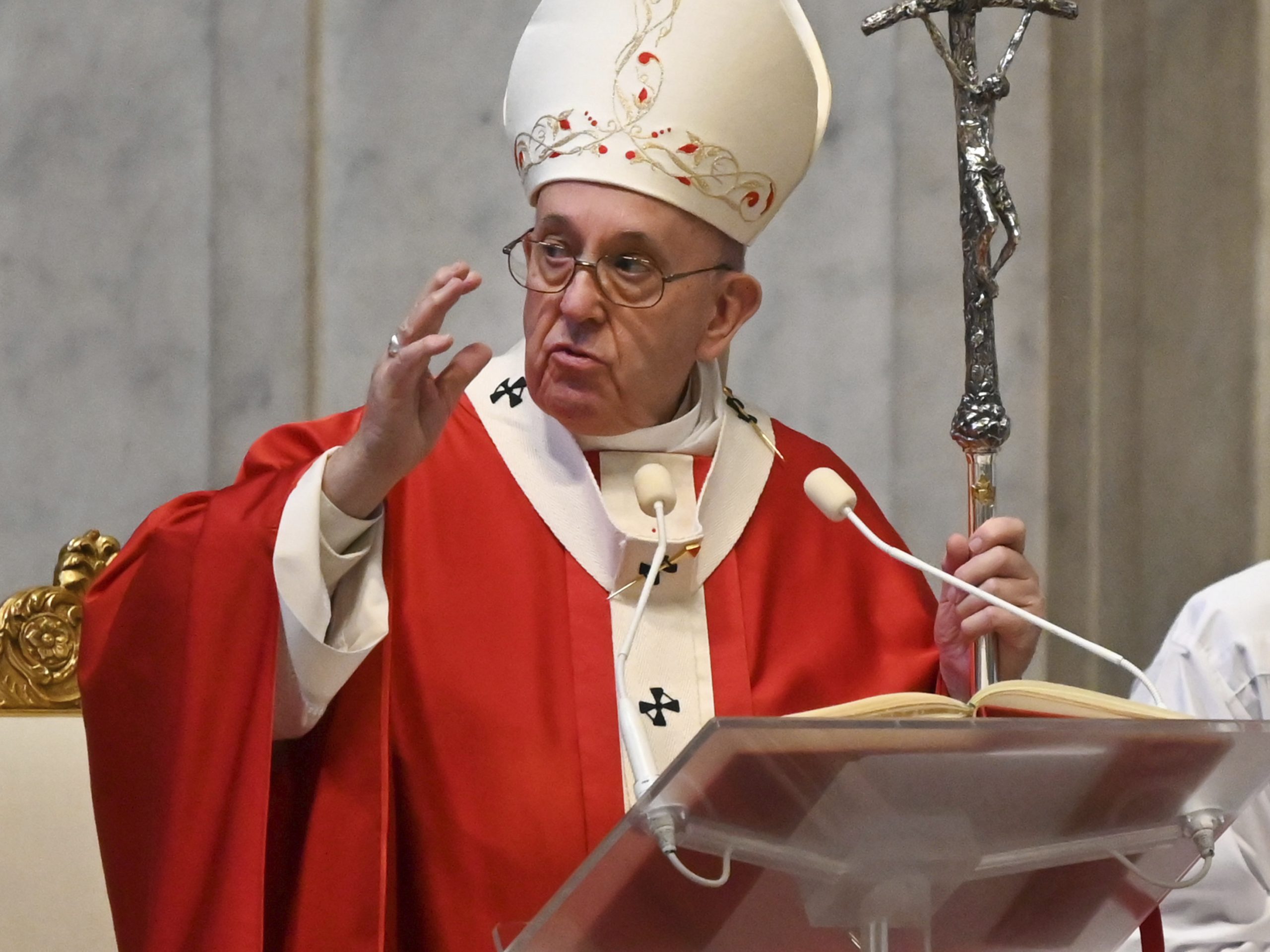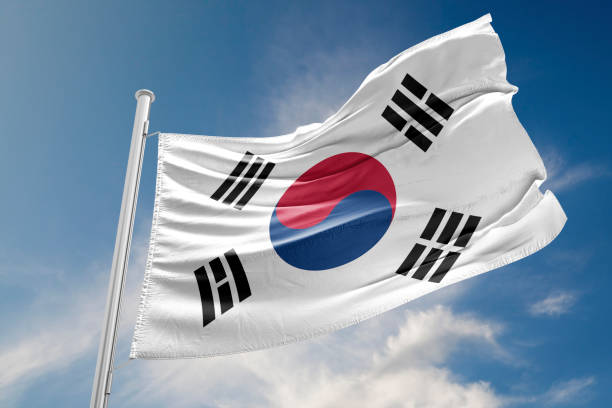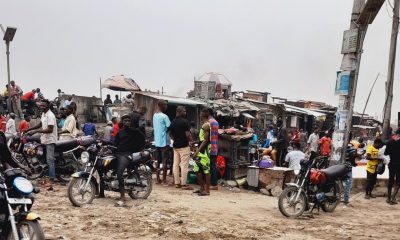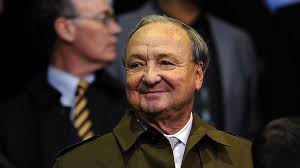Foreign News
Easter Message: Pope Slams Weapons Spending in Time of pandemic

Pope Francis has urged countries to quicken the distribution of COVID-19 vaccines, particularly to the world’s poor.
The pontiff described armed conflict and military spending during a pandemic as “scandalous’’.
He gave the advice in his Easter message on Sunday.
“I urge the entire international community, in a spirit of global responsibility, to commit to overcoming delays in the distribution of vaccines and to facilitate their distribution, especially to the poorest countries,’’ he said.
Coronavirus has meant this has been the second year in a row that Easter papal services have been attended by small gatherings at a secondary altar of St.
Peter’s Basilica, instead of by crowds in the church or in the square outside.After saying the Mass, Francis read his “Urbi et Orbi” (to the city and the world) message, in which he traditionally reviews world problems and appeals for peace.
“The pandemic is still spreading, while the social and economic crisis remains severe, especially for the poor.
“Nonetheless and this is scandalous, armed conflicts have not ended and military arsenals are being strengthened,’’ he said.
Francis, who would normally have given the address to up to 100,000 people in St. Peter’s Square, spoke to fewer than 200 in the church while the message was broadcast to tens of millions around the world.
The square was empty, except for a few police officers enforcing a strict three-day national lockdown.
The Pope asked God to comfort the sick, those who have lost their loved ones and the unemployed.
He urged authorities to give families in greatest need a “decent sustenance’’.
He praised the medical workers, sympathised with young people who are unable to attend school and said everyone was called to combat the pandemic.
“There are still too many wars and too much violence in the world! May the Lord, who is our peace, help us to overcome the mindset of war,’’ Francis, who has often called for disarmament and a total ban on the possession of nuclear weapons, said.
Noting that it was International Awareness Day against anti-personnel landmines, he called such weapons “insidious and horrible devices … how much better our world would be without these instruments of death!’’
In mentioning conflict areas, he singled out for praise “the young people of Myanmar committed to supporting democracy and making their voices heard peacefully’’.
More than 550 protesters have been killed since a Feb. 1 military coup in Myanmar, which the Pope visited in 2017.
Francis called for peace in several conflict areas in Africa, including the Tigray region of northern Ethiopia and the Cabo Delgado province of Mozambique.
He said the crisis in Yemen has been met with a deafening and scandalous silence.
He appealed to Israelis and Palestinians to “rediscover the power of dialogue’’ to reach a two-state solution where both can live side by side in peace and prosperity.
Francis said he realised that many Christians were still persecuted and called for all restrictions on freedom of worship and religion worldwide to be lifted. (Reuters/ NAN)
Foreign News
Hong Kong votes in Election as City Mourns Deadly Fire

Hongkongers are voting in an election seen as a test of public sentiment following a deadly fire that angered some in the city.
The government has mounted a huge campaign to encourage Hongkongers to choose members of the Legislative Council (LegCo). All of the candidates have been vetted to ensure they are loyal to China.
The election takes place as many are mourning the Tai Po fire last month which killed nearly 160 people.
In recent days, authorities have distributed aid to survivors, arrested suspects and sought to improve building safety, as some Hongkongers raise questions about the incident.
A total of 161 candidates are competing for 90 seats in the LegCo, which acts as a mini parliament and can make and amend laws.
The election is the second since 2021 when China made sweeping changes to Hong Kong’s electoral system to ensure only “patriots” could run for seats.
Beijing has said the changes, which were put in place shortly after the 2019 protests, were necessary to ensure stability in Hong Kong, but critics say they weakened democracy.
The last poll, which took place shortly after those changes, saw its lowest-ever turnout of 30% amid widespread voter apathy.
This year, the government has blanketed the city with posters urging Hongkongers to head to the polls, while dangling freebies and shopping discounts.
After casting their vote, each person will receive a “thank you card” that could be redeemed for vouchers in selected shops and restaurants, or for beauty services, medical check-ups and insurance policy premiums.
Authorities are also offering free entry to public swimming pools and museums on the polling day, organising carnivals in various neighbourhoods, and holding a televised variety show and gala.
They have also created cartoon mascots and a theme tune for the election, adapted from a 2001 hit song by Cantopop star Aaron Kwok, called “Let’s Vote, Together We Create The Future”.
Chief Secretary Eric Chan told reporters last month that the measures were aimed at ensuring “a happy and festive mood” and to “let residents recognise the importance of the election”.
But in recent days the city has been focusing on the 26 November fire that engulfed high-rise residential blocks at Wang Fuk Court in the northern district of Tai Po.
The blaze was the worst seen in Hong Kong in more than 70 years. The death toll, which currently stands at 159, is likely to rise further as officials continue to recover bodies.
As Hong Kong mourns its dead, some are asking whether the fire could have been prevented and questioning building safety standards. Many Hongkongers live in ageing high-rise buildings similar to Wang Fuk Court.
Authorities have since ordered the creation of an independent committee to investigate the cause of the fire, and have arrested 13 people for suspected manslaughter.
They have also ordered the removal of scaffolding mesh used in all building renovations across the city. Investigators have found that a scaffolding mesh used for renovations in Wang Fuk Court failed to meet flame retardant standards, and that the fire spread quickly due to the mesh and other flammable materials on the outside of the buildings.
Authorities have also moved quickly to quell dissent. Police have reportedly detained a man, who was part of a group petitioning for an independent inquiry, for suspected sedition on Saturday. The petition was also wiped from the Internet.
Two other people, including a former district councillor, were also taken in by police.
Political campaigning for the LegCo election was immediately suspended following the fire, though government-organised debate forums resumed after a few days. Carnivals organised for the election campaign have also been cancelled.
Hong Kong chief executive John Lee has insisted the LegCo election continue as planned as “we must move forward before we can turn our grief into strength”.
He said that the new legislators would be able to quickly support reconstruction and reforms.
John P Burns, emeritus professor and Chinese politics expert with the University of Hong Kong, said he believed the government would interpret a high turnout as a sign that voters perceive Hong Kong’s reshaped political system as “Relatively legitimate”.
But he expected the numbers to be low, in part due to the Tai Po fire.
He pointed out that most Hongkongers have traditionally supported the pan-democrat opposition – which have been effectively barred from taking part. “I think they won’t be convinced to participate this time, just as they mostly stayed away in 2021,” he said.
Mobilising the pro-establishment voters following the fire would be difficult for the government as well, he added.
Some in that camp will be impressed by how authorities have speedily re-housed those made homeless in the fire and the aid authorities have provided, “which by any measure has been rapid and relatively generous”, noted Prof Burns.
Hong Kong’s national security office this week reposted a commentary from a pro-Beijing news outlet that urged residents to vote to show support for government’s reconstruction efforts.
This year’s LegCo election will feature a number of new faces with about a quarter of the incumbent lawmakers stepping down.
Local media have reported that Beijing pressured several lawmakers to retire as they have unofficially set an age limit.
A number of those stepping down are aged above 70, including the prominent politician Regina Ip, a former security chief nicknamed the “Iron Lady”.
Foreign News
Tinubu Reaffirms Commitment to Protect Nigerian Children

By Ubong Ukpong, Abuja
President Bola Tinubu has expressed commitment to the development of children in the country.
He said this at the launching and public presentation of a new book titled The Power of a Teenager: 50 Ways to Inspire Change, written by Chairman of the Public Accounts Committee, House of Representatives, and Founder of the Children of Africa Leadership and Values Development Initiative (CALDEV), Rep.
Bamidele Salam on Thursday.Tinubu, who was represented by the Senior Special Assistant to the National Assembly, House of Representatives Liaison, Dr. Ibrahim Olarewaju, commended Salam for his dedication to youth development.
“You may not fully understand the impact of what you are receiving now, but tomorrow you will see what.
Hon. Bamidele Salam has done in your lives,” he said.He urged all attendees to make a personal commitment to shaping the minds of young Nigerians, stressing that while Salam funded the initiative personally, the greater task lies in mentoring and guiding the nation’s youth.
The Vice President, Kashim Shettima, described the launch as a clear demonstration of the potential of Nigerian children.
Represented by Senior Special Assistant, Dr. Kingsley Uzoma, praised Salam for aligning his work with the administration’s vision for youth empowerment.
“This initiative speaks directly to the leaders of tomorrow,” he added, commending both the organisation and the children participating in the programme.
Chief of Staff to the President, Femi Gbajabiamila also lauded Salam’s efforts.
“Nigerian children are the future of this nation. Even though they are young, we are looking to them to take this country to where it should be,” he said.
Gbajabiamila commended Salam for consistently producing the book annually, calling it a testament to leadership and commitment.
“Leadership may be inborn or thrust upon you, but there must be someone to guide you. That is what this book is doing—it provides the guidance our young people need,” he said, urging children to read and internalise its lessons.
Speaking at the event, Rep. Bamidele Salam shared the story of how CALDEV was founded in 2015 to fill a gap in Nigeria’s educational system.
Unlike in other countries, he said, leadership training is rarely embedded in the curriculum. Through CALDEV and its flagship National Children’s Leadership Conference, children gain practical exposure to leadership, public speaking, and community service.
Many past participants have gone on to start NGOs, run radio programmes, and lead campaigns addressing early marriage, child labour, and other social issues.
“This year, about 400 children are participating, and the impact has been phenomenal,” Salam said. He urged state governments to replicate the initiative at the state level to provide young people across Nigeria with intensive leadership training. Highlighting the large participation from Borno State, Salam said that properly trained and nurtured children could become agents of change, promoting peace, tolerance, education, and societal development.
Minority Leader of the House of Representatives, Kingsley Chinda, lauded Rep. Bamidele Salam for his dedication to youth development through the newly launched book.
Chinda expressed pride that a member of the House is actively shaping the future of Nigerian children.
“As members of the House of Representatives, we hold our heads high today that one of us is doing this. We are very, very proud, and we pray that this inspiration should flow through every other member of the House,” he said.
Chinda noted that the legacy of leaders and thinkers is remembered not for wealth but for wisdom and the knowledge they left behind.
“When we see initiatives like this, these are the things worthy of celebration,” he said.
Member of the House from Borno State, Zainab Gimba, said,”We have come because we are celebrating not just a book today when they had an imagination behind it. I actually commend for shining the compassionate and bright lights of our teenagers.
“He has given our young people a voice that others will also step on the same foot, so that our teenagers will be empowered, not in this generation, but in future generations to come.”
Foreign News
Ex-South Korean President Yoon Charged with Aiding Enemy State

Former South Korean president Yoon Suk Yeol, currently in jail after being impeached and removed from office, has been charged with additional offences, including supporting an enemy state.
The prosecutors said this on Monday.
Yoon, 64, is accused of attempting to provoke a military conflict between South and North Korea by covertly sending drones into the North, in an effort to legitimise a state of martial law he declared late last year.
Prosecutors argued that the drone deployment in October 2024 led to the leak of military secrets to the North as the vehicles crashed near Pyongyang.
The conservative politician has been in pre-trial detention for months and already faces charges over the declaration that include high treason, a crime punishable by life imprisonment.
Yoon’s dramatic action on December 3 plunged the country into a deep political crisis.
He justified the move by claiming that the left-wing opposition had been infiltrated by communist and anti-state forces, though he presented no evidence to support the allegations, and it was soon overturned.
Left-leaning Lee Jae Myung is now president; he won an early presidential election in June following Yoon’s removal from office in April.





























